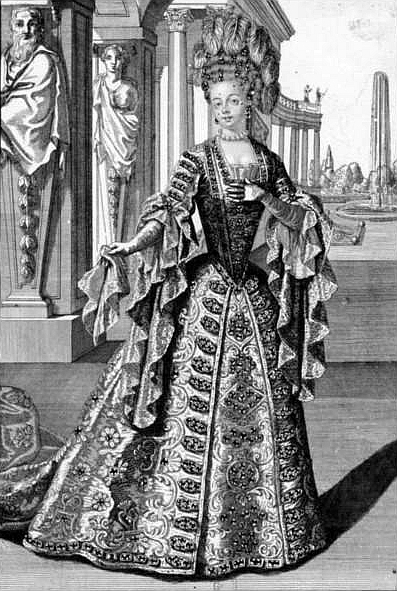April 30, 2017


Here’s one famous figure that you likely didn’t study in high school history class, but whose story could put Game of Thrones to shame. Legendary opera singer, Julie d’Aubigny may not be a household name, but she recaptures the public eye every now and again, like in 2013 when a Tumblr account showcased fan-drawn portraits of her. Why are people fascinated with Julie centuries after her birth in 1673? Partly because many see her as a sobering example of how sexuality was treated and exposed in the past.
From a young age, Julie cross-dressed as a male page in order to learn things she wouldn’t otherwise couldn’t as a girl, including horse-riding and fencing. At 14 years old, she became the mistress of Comte d’Armagnac, but when he was given a job in the outer provinces, she stayed in Paris. Julie then became lovers with Serannes, one of her fencing school’s masters. When Serannes killed a man in a duel and was forced to flee to avoid execution, she ran away with him and they started to put on fencing shows together.
Because of her natural talent, Julie also took up opera singing and was encouraged to perform on stage. At some point, however, she broke up with Serannes and had her first public affair with a woman. Although the unnamed woman’s parents put her in a convent, Julie did not let that stop their relationship. She masqueraded as a nun and continued the affair, and the two soon fled but eventually grew apart. Julie was later found guilty of kidnapping a nun and arson, and sentenced to death by burning. As you might have gussed, Julie ran to escape the charges. She made her living singing in bars until a man named Marechal discovered and trained her in acting, only to urge her to head to Paris.
On her way north towards Paris, Julie met the man who would be her greatest friend and on-and-off-again lover: Louis-Joseph d’Albert, son of the Duke of Luynes. Their friendship started differently than yours probably have, though: it began with a duel. After he insulted d’Albert insulted her, they fought, and Julie ended it by piercing his shoulder. When she left d’Albert to go through Rouen to Paris, she met Gabriel-Vincent Thevenard, another extremely talented singer. Comte d’Armagnac, her former lover, persuaded King Louis XIV to allow her into Paris despite her death sentence, and the King agreed because he thought her tale was “somewhat amusing.”
Now, for the part of the story that music lovers have been waiting for: After reaching Paris, Julie auditioned for the Paris Opera and, thanks to her voice and stunning beauty, succeeded at playing older roles. Her range was mezzo-soprano, halfway between soprano and contralto, and her most famous opera was written just for her – Tancrede in 1701. It was the first opera in France to feature a part for a lower female voice, and although others were written for her as well, none experienced as much success as Tancrede.
Being d’Aubigny, she had many affairs with her fellow Opera stars, including the lead singer, Marie Le Rochois, and a man known as Fanchon. Fanchon refused her advances, so she challenged him to a duel as a man so he would not recognize her. Julie stole his watch and match-box, and when Fanchon tried to play off the injuries from the duel, Julie c revealed that it was she, a woman, who had beaten him – and, as proof, gave him back his “miserable watch and snuff-box” in front of many others, to his embarrassment.
Another scandal featuring this legendary woman? At a ball, while dressed as a man, she danced and kissed a “beautiful young noble lady.” The lady’s three suitors challenged Julie to a duel and she beat all three of them.
d’Aubigny’s string of romances didn’t occur without heartbreak, however. In 1703, she fell in love with Marie-Therese-Louise de Senneterre de Lestrange, who was “reportedly the most beautiful woman in France.” When Marie died from a fever in 1705, and Julie never fully recovered. She retired from stage and died in 1707.
Over her lifetime, Julie d’Aubigny broke the norms of 17th century France, not to mention fought and killed at least ten men in duels. Her story is one that is almost too ridiculous to believe, that it reflects the woman who lived it: one who denied any and all boundaries and always chased after her latest dream.